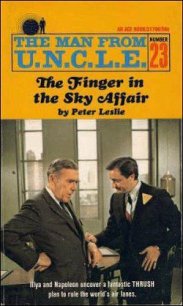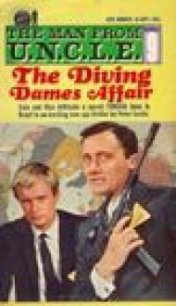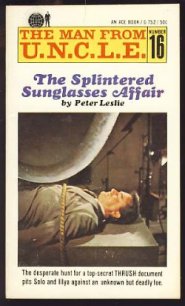The Unfair Fare Affair - Leslie Peter (читать онлайн полную книгу txt) 📗
"Nothing definite," the Dutchman agreed. "We have still not found traces of the Minerva taxi, the boatman called Jaap, the man Willem, or three supposed Germans in green leather coats. But as this country may have been only an interim stage in the process, perhaps this does not surprise."
"Do you know if Mr. Waverly's deductions were correct? Have you found out anything more about the collision at sea?"
"Oh, yes"—the police chief opened more files, rustled more paper—"the boat was salvaged. It was an old German naval craft converted. They found one body on it: it was Fleischmann, all right. But there was no sign of the mysterious Willem or any third man."
"Still, it looks as though it was to have been a link in the chain that Waverly inadvertently joined, don't you think?"
"Perhaps, perhaps."
"Apart from the details that Waverly happened across, your informants can't offer any concrete leads at all, then?"
The Dutchman sighed heavily. "I am afraid not. It is difficult, you see. Since there have not been any spectacular escapes from here, we have really no reason to investigate such an organization or to verify if it exists. This was just by a chance of cross-referencing that we turned up these few points I have quoted to you. There may be more allusions to it buried in transcripts of evidence or examination of witnesses... but under what subject do we look for it in the files?"
"I do see your problem," Solo said. "To sum up, then—we can say that it is rumored among police informers that an escape organization exists but that none of them can supply positive facts to support the rumor?"
"Precisely, Mynheer Solo."
"And nothing has occurred within police jurisdiction in this country from which the existence of such a network could be deduced?"
"Nothing." The policeman was ferreting about in one of the folders. He gave a grunt of satisfaction and held up a piece of paper covered in typed notes. "There is just a small thing," he said. "It may not be important. But it says here that the informer who was most positive about the thing had just returned from Vienna."
"A tale from the Vienna woods. It's not much of a lead," Solo said ruefully. "But it's better than no lead, I guess. Go east, young man!"
The rented car emerged from the leafless forest and swooped downhill to the capital after dark. Solo's first impression of Vienna was that there were more lights there than he had ever seen in a city before.
Their brilliance mapped the city against the night, glittering along the main streets, garlanding squares and parks and promenades. Shops, theaters, hotels, and public buildings were ablaze with light—and what made the spectacle more interesting still was that it was all of the same kind. Instead of the usual jungle of red, blue and green neon, flashing advertisements, yellow sodium lamps, and floods, the place seemed to be lit with ordinary white bulbs everywhere—a firmament of silver stars coruscating against the sky in the cold, crisp air.
Solo left the car at a multistory automat garage in the old Markplatz, where it was whisked aloft and stacked in a numbered niche somewhere far above. He crossed the square and booked in at the Hotel Ambassador.
There was a full restaurant service on each floor, and a train of white-jacketed waiters with trolleys flung open the tall, narrow double doors of his room and served him dinner at an eighteenth-century marquetry table. There were two wash-basins and two tubs in the bathroom, the wallpaper was in gold and white stripes, and the drapes were in gold velour. Solo slept between apricot-colored merino blankets and drank hot chocolate for breakfast, feeling absurdly like the romantic lead in an outdated Hollywood movie.
Later, in a glass and steel office overlooking the Karntnerstrasse near the old cathedral, he was brought face to face with the present day.
The small, secret, and highly efficient research unit—which dated from four-power occupation days and was attached to central police headquarters—was run by a statistician, a one time market research genius who had held a chair in psephology and had been seconded to this post at the insistence of the Ministry of the Interior.
Watching his lined, intent face as his eyes flicked among the cards of a rotary index, admiring the deft shuffling of his fingers as he sorted those he had selected into categories, the agent was imbued with confidence. If there was anything to be found out about Waverly's escape network, he felt, this was the place in which he would find it. This quick thinking little man with the goatee would come up with the answers—if there were indeed any answers to find.
"I must compliment you, Herr Doktor, on the efficacy of your system," Solo' said. "I almost pity the criminals who have such an organization to beat!"
The little man smiled absently. "You are too kind," he said in faultless English. "I am afraid we are not as rapid as we would like. Now that I have the cards, I must ask you to wait four minutes while we program the computer. After that, we shall see…"
And in precisely four minutes, with a soft thud and a discreet hiss of compressed air, a container dropped into a basket by his desk from the tube leading to the computer room somewhere far below.
He unscrewed the top and removed the cylinder of paper inside. "Ah, yes, of course," he said. "Typical of the computer! These machines will compartmentalize! One can perhaps have too much of categorization, of placing things each under its proper heading. Still...
"The computer lists five different species of escape network existing in this country... Assisted Movement Operations, as it quaintly calls them…"
"Five!" Solo exclaimed in astonishment.
"Oh, yes. Five. Section One, (a), positive, is an organization for taking willing undercover agents east of the so called Iron Curtain. It operates rather clumsily, beneath the umbrella of one of these student cultural exchange groups. And it is of course financed by the CIA. Section One, (b), positive, is a similar network for infiltrating East European operatives into countries on this side of the Curtain."
"Run, I suppose, by the KGB?"
The little man nodded. He ticked off two paragraphs at the top of the paper with a gold ballpoint carrying a black tassel and continued, "Section Two (a), negative, is run by a different branch of the KGB. It occupies itself with the ferrying of unwilling persons from West to East—and it is, not to put too fine a point upon it, an agency for the kidnapping and drugging of scientists, military defectors or other personnel whom they would like to see back, for one reason or another, at secret police headquarters over there.
"Section Two, (b), also negative, attempts with less success to do the same thing in reverse. Except that instead of running it themselves, the CIA employs a group of barbouzes—unemployed ex-paras from Algeria.
"I need not tell you the kind of customers these networks have—Burgess, Philby, Blake, the East German security chief who defected and was kidnapped and taken back again, the Israeli spy who was found drugged in a trunk in Rome airport, that French colonel who was abducted in Munich and delivered, bound and gagged, in a van in Paris, the Chinese legation people from the Netherlands—all of these, even if they didn't necessarily pass through Austria, used one of the networks which exist here."
"You don't mean they are exclusively Austrian organizations?"
"No, no. Just that because they have branches here, as it were, they thus appear on our computer programs."




